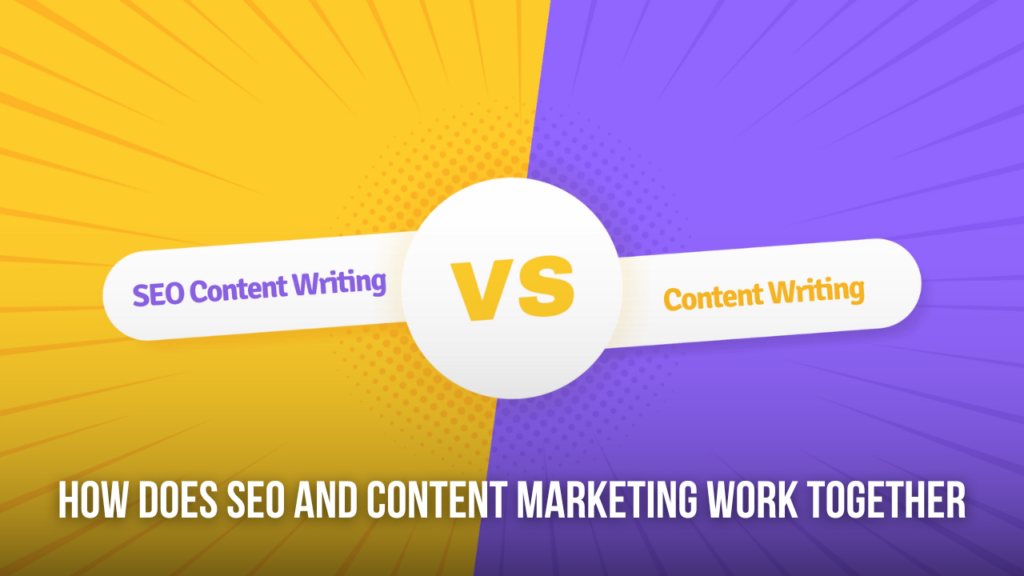How Does SEO and Content Marketing Work Together

In today’s world of innovative marketing, businesses as well as marketers often come across both SEO and content marketing as vital tools if they want to strengthen their online visibility, audience, and sell more. Still, it is equally necessary to see how these two strategies are interrelated, especially in terms of creating more sophisticated and blended marketing mix. Despite the fact that marketing and SEO content have their own particular purposes, they have a close connection and tend to collaborate to reach the abovementioned goals easily. In this article, we will cover how content marketing and SEO work together, what separates the two and how you can simultaneously leverage each of them.
What is SEO?
SEO, or Search Engine Optimization, revolves around making strategic improvements to a website’s content in order to increase its visibility on search engines like Google, Yahoo and Bing. Therefore, seeking to improve a website’s organic traffic, which constitutes the audience that visits a website without any advertisements, remains the principal aim of SEO. The activities that…SEO entails keyword research, website analytics, search engine optimization, linking strategies, among others.
SEO focuses on making sure that the website has the required technical aspects and content so that search engines can rank it well. This includes things such as the plan of the page, the use of keywords, the interlinking and the backlinks which help improve the ranking of the site in SERP.
What is Content Marketing?

Content marketing is the process of and practice of creating, publishing and sharing content that is valuable, relevant and consistent to a particular audience. The intention is to build confidence, inform and eventually change the audience to become active customers. Content marketing encompasses a number of formats including and not limited to blog posts, videos, social media posts, whitepapers, eBooks, infographics, and podcasts.
Unlike conventional promotion, marketing content is centered on creating value for the target market rather than attempting to sell them a product or service. This creates a lasting bond with new customers, which in turn increases the level of sales and confidence in the brand. In the right hands, content marketing can bring traffic, leads, and customer retention.
How SEO and Content Marketing Work Together
Both SEO and content marketing are essential components of a holistic digital marketing strategy. While they are distinct, they work together to achieve common objectives like driving traffic, increasing brand awareness, and improving conversions. Let’s break down how they interact:
1. Content as the foundation of SEO
The third point is content marketing and SEO synergy. In any context, high-quality and relevant content leads to ranking on the search engine. SEO involves useful content that is well-optimized to answer users’ questions. It involves the perfect ratio of targeted keywords and informative answers that appeal to users.
Without content, there would be little for SEO would have little content marketing strategy to offer the raw material—articles, blog posts, and other pieces of content—that SEO can then optimize with keywords, meta tags, and internal links.
2. Keyword Research for Content Creation
Keyword research is one area that overlaps the most between SEO and content marketing. It involves searches that SEO professionals conduct to identify users’ terms or phrases when trying to find information related to a given product, service, or topic. The direct consequences of these findings are used to guide content creation.
Using the right keywords in your content ensures it is on the same page as the search intent of your target audience for successful content marketing. This is why content marketers can add high-ranking keywords to blog posts, social media updates, and video content. Therefore, both SEO and content marketing complement each other to achieve their goals. Such content is more likely to rank on search engines because it is purposefully built around those keywords.
3. On-page optimization for improved rank positions
Once the content is developed, SEO and content marketing will both play a role in getting rankings of search results. On-page SEO ensures that each of the web pages is optimized, thus including proper placement of keywords, meta descriptions, titles, header tags, or alt text of images in them. Content marketers create rich content, while the experts in SEO examine if the content is structured and formatted correctly as well.
For example, if an article answers a question or topic, keywords are relevantly used in the title, headings, and within the content. The internal link to relevant articles, as recommended by the SEO team, guides visitors to more content and improves the overall site’s SEO.
4. Content Promotion and Link Building
The importance of link building in SEO depends on creating quality shareable content. In the context of content marketing, when a marketer creates informative, interesting, or entertaining content, the probability of that content being shared, mentioned, or linked back to other websites, blogs, or influencers also increases the authority and rank of the website.
This can be further utilized by making the content shareable, thus creating an opportunity for external backlinks, which incidentally is a strong ranking factor in most search engines. This way, SEO and content marketing complement each other and drive traffic from organic search and other social or referral sources.
5. Analytics and Continuous Improvement
Another way SEO integrates with content marketing is through analytics. SEOs depend on data to monitor performance, measure ranking, and find places for optimization. Content marketers can then use this insight to adjust the content strategy and combine efforts with what users want and what searches are on.
For example, if keyword search data reveals that some keywords are driving traffic to certain blog posts, then content marketers can produce more content around those topics. Similarly, if certain types of content are doing well (videos, case studies), content marketing strategies can be adjusted to produce more of that format, thus both the content and SEO efforts being continually optimized.
Difference Between Content Marketing and SEO
While SEO and content marketing overlap and coexist usually, it is worthwhile to note the differences.
- Focus: SEO focus is to improve a website’s search engine position. Content marketing focuses on creating valuable, informative content that will engage their target audiences.
- Process: SEO is a technical process that has keyword optimization, backlinks, and user experience. Content marketing is the creation of content that meets the needs and interests of the audience.
- Goals: The ultimate aim of SEO is to rank higher on SERPs so that the traffic to your website will be organic and natural. Content marketing is aimed to engage, inform, and build a relationship with the audience to drive conversions.
Although SEO and content marketing may differ in specific areas of concentration, both are bound to increase visitors and engage an audience while inducing business growth.
How to Leverage Both SEO and Content Marketing
To leverage both SEO and content marketing, business firms should:
- Conduct keyword research: Identify highly ranking relevant keywords that could drive traffic to your content. Use those keywords in guiding content creation and optimizing SEO.
- Create high-quality content: This is the best way to attract visitors. Your content should be informative, and entertaining, and solve problems or answer questions. This not only attracts visitors but also encourages social sharing and backlinks, which improve SEO.
- Content optimization for SEO: Now, one needs to optimize their newly created content for the search engines with adequate keywords, meta description, alt text, and internal links. This makes it easier for search engines to crawl and rank the content.
- Analyzing performance: Engage analytics tools in tracking both the performances of your content and SEO efforts. With such data, refine both strategies to get better results.
- Make it shareable: Inspire people to share your content on their social networking sites. The social signals can be indirectly useful for SEO purposes, as they increase visitors to your site and make it more visible.
Conclusion
In conclusion, SEO and content marketing are both powerful entities that can be mutually reinforcing and significantly boost the website’s visibility, drive organic traffic to your website, and hence increase conversions. Content creation can be aligned with SEO strategies, including keyword research, on-page optimization, and link building. Thus, the content that is going to rank well in the search engines will be of real value to the audience. In many ways, the approaches can be deemed to differ in content marketing and SEO as they concentrate on different aspects, but they do share the common goal of getting increased traffic, better engagement, and growth in general. The more that businesses understand how SEO and content marketing work together, the more comprehensive and effective an overall strategy will be.

